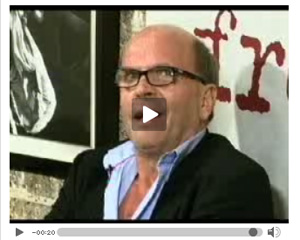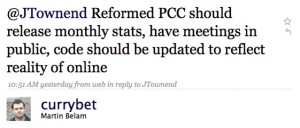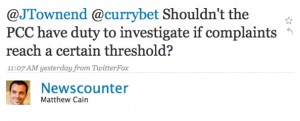Anthony Salz, who is chair of the Independent Press Review Group and also on the Board of the Media Standards Trust, has replied to a letter from the chair of the Press Complaints Commission, Sir Christopher Meyer, (February 19, 2009), which made criticisms of the MST review calling for reform of UK press regulation, published on February 9, 2009.
Wednesday 11th March
Dear Sir Christopher,
Thank you for your letter of 19 February.
We will, of course, take it into account in the second stage of the review. In the meantime I feel I should reply to some particular assertions you make about the report.
1 Bad Faith
You suggest that the review is not being undertaken in good faith because we did not ask you to contribute to what you describe as a strident report. This suggestion of bad faith is entirely unjustified. I also strongly object to your personalised attack on the Director of the Media Standards Trust (MST).
The MST is an independent registered charity. It operates much like any other think tank and receives funding by donations from Foundations and individuals. This has included grants from the Esmée Fairbairn Foundation, the Nuffield Foundation and the Joseph Rowntree Charitable Trust. It was set up to foster high standards in news on behalf of the public.
We state clearly in the report that it represents Part 1 of a two-stage review. The first part is an analysis of the current system of self-regulation (including, apart from the PCC, the legal cases, issues concerning user-generated content, the Motorman investigation, the challenge to achieve consistency of regulation and governance of regulators). This is based on publicly available information and on the findings of a recent YouGov poll that the MST commissioned.
No-one was formally consulted in the first stage. The analysis in Part 1 was always intended to start a debate and provide a basis from which we could consult widely. Consultation with the PCC alone in advance would have been inappropriate. We felt it important that Part 1 should not be influenced by a key body with a particular interest. The PCC has shown that it is, of course, well placed to obtain media coverage for its reply.
All members of the Review Group feel that there is a need for change and that the report facilitates a debate. We are keen that the PCC, those who have been involved with it and its stakeholders are part of that debate.
2 PCC Statistics
You claim that the report “fundamentally misinterpret[s] the PCC’s statistics”. Your letter cites one statistic in support of this claim – that less than 1 in 250 complaints is upheld in adjudication. This statistic is not in fact in the report, though it was mentioned by Sir David Bell on air. It derived from your 2007 Annual Report. Page 25 states that the PCC adjudicated in 32 cases of which 16 were upheld against newspapers, from a total of 4,340 complaints (equating to 1 upheld adjudication for every 271 complaints).
As your letter illustrates, the PCC’s figures and terminology are somewhat difficult to follow. The explanation in your letter is helpful, as is the recent addition to your website “the Facts behind the Figures”. Both show why readers of your published materials have had a hard time understanding what is going on. However you explain your terminology, 32 adjudications from 4,340 complaints is to me a small number of adjudications.
Our report acknowledges that you dispute the value of using adjudications as a measure (on page 28). We feel, nevertheless, that the number of adjudications is important – since it is the only public sanction the PCC has. Others have also argued for their importance. Professor Greenslade last year, for example, told the House of Lords Select Committee that “The failing of the PCC is the failing to adjudicate often enough”. Without adjudication, he went on to say, “newspapers escape censure and punishment too often when they actually at the final hour do some kind of deal to get themselves out of a mess, when they breach the rules as it were”.
3 Inaccuracy
You stated on air, and repeat in your letter, that the report has many inaccuracies. In addition to the 1:250 point above, you cite only the statement that the ASA was modelled on the PCC. You are right: it was in fact modelled on the Press Council, the predecessor to the PCC (Richard Shannon, A Press Free and Responsible, p.13). The substance of the point still stands but we will, of course, correct the reference.
4 2007 Select Committee
In your letter you criticise the report for failing to mention the Select Committee on Culture, Media and Sport, 2007. You suggest that this Select Committee makes the PCC accountable. The CMS Select Committee has led important examinations of aspects of self-regulation although it is not constituted to hold the PCC to account. Select Committees are held at irregular intervals and the Committee ‘chooses its own subjects of inquiry’ (from its website). The 2007 Select Committee, for example, focused closely on the issues raised by the harassment of Kate Middleton, Clive Goodman’s conviction, and Operation Motorman.
Reference to the 2007 Select Committee report might have been useful. It expressed concern about the ‘complacency of the industry’s reaction to evidence presented by the Information Commissioner showing that large numbers of journalists had had dealings with a private investigator known to have obtained personal data by illegal means’ (p.3). It went on to say ‘we are severely critical of the journalists’ employers for making little or no real effort to investigate the detail of their employees’ transactions. If the industry is not prepared to act unless a breach of the law is already shown to have occurred, then the whole justification for self-regulation is seriously undermined’ (p.3).
It said that the current form of press self-regulation offered more protection than relying exclusively on the law. This is important and should indeed be a purpose of self-regulation. It noted (as we do in our report) that the Press Complaints Commission ‘has evolved’, and said that it had ‘become a more open body which provides a better service to complainants’. However, it also made clear that ‘This Report is not a broad look at whether the system of self-regulation as currently operated by the industry is the best way to curb unjustified practices and punish those who publish material obtained in such ways. To reach a properly informed view on such a complex subject would require more time and more evidence’ (p.5).
The same Select Committee concluded its Summary by saying that ‘The system for regulation of the press raises serious and complex issues which may merit a broader investigation than we have been able to undertake here. We believe that this is a subject which… deserves careful examination in the future’ (p.4).
These statements, taken together, both acknowledge positive changes in the PCC and support the case for a broader review of press self-regulation.
5 Some Substantive Questions
You say the PCC must give priority to the forthcoming hearing of the Select Committee. After this, I would be interested to meet with you and your colleagues to hear the PCC’s views on some of the substantive questions that are raised about future press regulation. For example:
• Is it sufficient that the PCC’s constitution essentially sets it up only as a complaints-handling body?
• Would it not be preferable to avoid having working editors on the Press Complaints Commission (as distinct from those who have worked in journalism)?
• Would the position of the PCC as a regulator be assisted if it could be given greater powers to ‘enforce’ its decisions for the benefit of a complainant, making it more ‘competitive’ with the legal route?
• Would you consider that there should ideally be some structure for independent appeal against a decision made by the PCC?
• How might the PCC change in order to meet growing expectations of public accountability (expectations that are fed by the press)?
• Why should the PCC not be covered by the Freedom of Information Act (assuming that it would be possible to protect the privacy of complainants who wanted it)?
• Is there any reason why the PCC should not make its sources of revenue transparent?
We have been clear that our first report is a starting point for debate. Though I welcome your response, I do not accept your characterisation of our report.
I look forward to a discussion in the coming months of the issues raised about the future shape of press regulation.
Yours sincerely,
Anthony Salz



